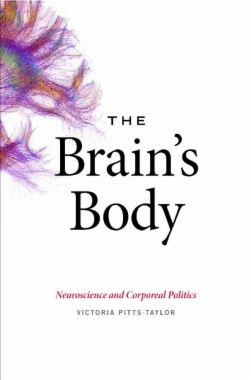In The Brain's Body Victoria Pitts-Taylor brings feminist and critical theory to bear on new development in neuroscience to demonstrate how power and inequality are materially and symbolically entangled with neurobiological bodies. Pitts-Taylor is interested in how the brain interacts with and is impacted by social structures, especially in regard to race, class, gender, sexuality, and disability, as well as how those social structures shape neuroscientific knowledge. Pointing out that some brain scientists have not fully abandoned reductionist or determinist explanations of neurobiology, Pitts-Taylor moves beyond debates over nature and nurture to address the politics of plastic, biosocial brains. She highlights the potential of research into poverty's effects on the brain to reinforce certain notions of poor subjects and to justify particular forms of governance, while her queer critique of kinship research demonstrates the limitations of hypotheses based on heteronormative assumptions. In her exploration of the embodied mind and the "embrained" body, Pitts-Taylor highlights the inextricability of nature and culture and shows why using feminist and queer thought is essential to understanding the biosociality of the brain.
- Cover
- Title
- Copyright
- Contents
- Acknowledgments
- Introduction: The Social Brain and Corporeal Politics
- Prelude
- The Social Brain
- Science and Critique
- Corporeal Politics
- The Brain’s Body
- 1. The Phenomenon of Brain Plasticity
- Figuring Plasticity
- Construct, Property, or Phenomenon?
- Whose Work Is It?
- Plasticities of the Brain
- Habit, Learning, and Synaptic Plasticity
- Uneven Developments
- Stratifying the Adult Brain
- Plasticity and Socialization
- Material Performativity
- Poverty as a Neural Phenotype
- Conclusion
- 2. What Difference Does the Body Make?
- Prelude
- Materialism and the Rise of Embodiment
- The Embodied Mind in Naturalized Philosophy
- Epistemic and Embodied Multiplicity
- Multiple Realizability
- Disability as Assemblage
- Embodied Multiplicity
- 3. I Feel Your Pain
- Interlude: Wallet vs. Gun
- Neurons That Mirror
- Mind Reading without Words
- Interlude: Misreading Minds
- Shared Embodiments
- Biological Relationality
- Situated Neurons and Embodied Perception
- Empathy, Alterity, Otherness
- 4. Neurobiology and the Queerness of Kinship
- Prelude
- Stories of Kinship
- Oxytocin and Social Neuroscience
- Pair Bonds and Monogamous Voles
- Maternalizing the Brain
- Biobehavioral Synchrony
- Rethinking the “Complex” Bond
- Queer Ties and the Embodiment of Kinship
- Conclusion: The Multiplicity of Embodiment
- Notes
- References
- Index

